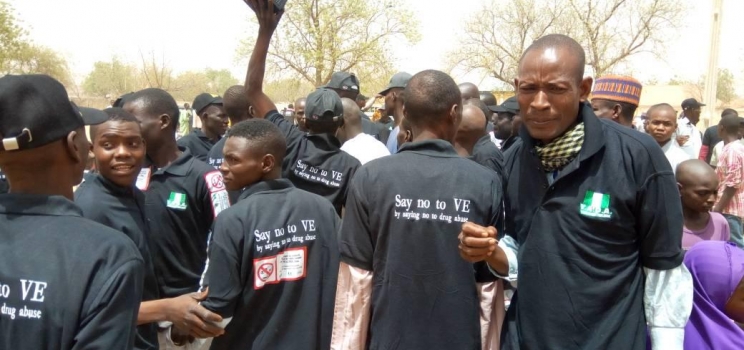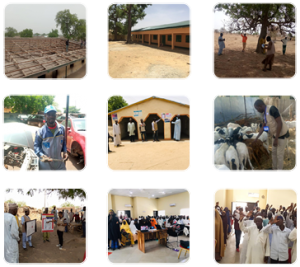Optimism as Gubio 1 youth become ambassadors for a drug free community
“..we are now more enlightened on the effects of drug abuse and we will continuously apply it in sensitizing our community until it is totally eliminated”

community youths from Gubio 1 marching on with cultural troupe during sensitization rally on Youth Against Drug Abuse Campaign
April 2018-It was a great day as teeming youths congregate on Saturday, 7TH of April’ 2018, Rallying in Gubio1 community, Borno state, Northeast Nigeria in a cavalcade and carnival mode with a solemn pledge to serve as emissaries of the “Youth Against Drug Abuse” (YADA) campaign, implemented by Centre For Community Development and Research Network (CCDRN), with support from USAID/OTI via North East Regional Initiative (NERI) to Sensitize young persons and build resilience to drug abuse in a bid to Counter the drug –related recruitment strategy of ISWA in Gubio and surrounding communities via awareness creation.
Communities in Gubio came alive with sounds of music and festive glitz that characterized the campaign. The carnival-like nature of the campaign created a palatable avenue for a vigorous enlightenment and awareness campaigns against drug abuse and its effects on individual and communal life and its links to violent extremism. The primary targets for the campaign were youth and adolescents aged 10-45 who are accessible to cheap and illicit drugs
Gubio1 is considered a highly exposed community located in the Borno corridor with frequent sightings of the extremists agents embarking on recruitment drives in the hinterlands. During the earlier organized community dialogue, community members revealed that while some of these youths may not be hooked up on hard drugs like cocaine, heroin and Indian hemp, popularly known as marijuana or weed, they do indulge themselves in substance abuse like codeine syrup or other cough mixtures and other drugs that are on the prescription list which can be obtained from the normal medicine or pharmacy stores
In Nigeria’s North east region, countless empirical studies and assessments have fingered drugs as having played a major part in the violent conflict linked to Boko Haram. Use of tramadol, codeine, rohypnol, marijuana, and other opioids, were said to be rampant in the militant group’s ranks, and many reports indicates that drugs and other substance abuse played a significant role in facilitating atrocities on both sides of the conflict. It is also considered a major recruitment strategy for extremist groups who reportedly use mооd- аltеrіng ѕubѕtаnсеѕ to vary the mind, change the user’s feeling, perception and influence their behavior. Youths especially are open to risk of either recruitment into Violent Extremist Organizations or taking part in violent extremists’ activities and other heinous and unconscionable crimes when under the influence of such controlled substances/hard drugs. However, some individuals in communities are oblivious of this trend.
Zannah Lawal Mustapha, is the village head of Gubio 1 community. Though, he seats on a very lofty chair at the community level, conversely, he knew little or nothing about the link between drug abuse and the violent book haram conflict prior to YADA. When CCDRN came with sensitization campaign, he soon realized and was very appreciative of the initiative.
“What we have heard from you today is not only useful or beneficial to the youth, but also to us the elders. Because we are now more enlightened on the effects of drug abuse and we will continuously apply it in sensitizing our community until it is totally eliminated” he said.
Findings from CCDRN baseline assessment indicate crosscutting reasons for the high rate of drug abuse and addiction in Gubio communities. The assessment revealed that peer group pressure, idleness as a result of lack of employment opportunity, frustration, ignorance of the dangers of drugs abuse, parental neglect and improper parental upbringing, and easy accessibility and availability of the drug in the community as some of the major reasons for the high prevalence rate of drug abuse amongst youth in Gubio LGA.
“We are into drugs because of frustration. A lot of us were formerly engaged in trading but with the closure of local Markets, we became redundant and eventually found ourselves in the abuse of drugs” Baba Kura Alhaji Bukar, popularly known as “Awilo” told CCDRN team during the YADA rally.
The Youth Against Drug Abuse program was conceived and implemented in a bid to reduce the rates of drug/substance abuse and addiction amongst the youth by a substantial percentage within 3 months from commencement Through the program, substantial awareness was created among 350 youth, stakeholders and community members in Gubio town with an anticipated reduction in drug induced violence among youth as well as recruitment by Boko Haram and ISWA. Community members and target youth groups projected genuine Anti-drug dispositions and committed to becoming YADA ambassadors
“I am into drugs for over fifteen years but never came across a program that enlightened me on the dangers of this habit until today. Thank you CCDRN and NERI, I pledge to be YADA ambassador by taking this campaigns to our colleagues who were not here” says Amarja Isa, one of the targeted youth from Gubio 1 community.
Amarja is not alone on the pledge to serve as YADA envoy; other targeted youth and community stakeholders’ having understood the effects of drug abuse, want it extended to other communities. There is also an advocacy from stakeholders on the need to provide youths with options for vocational skills acquisition affordable and marketable within their communities to preoccupy their minds and reverse their disposition to drugs abuse.
Implementing partners, Centre For Community Development and Research Network (CCDRN) collaborated with the drug demand reduction (DDR) unit of the National Drugs Law enforcement agency (NDLEA) in Borno state to develop appropriate messages based on contextual standard cutting across effects, predisposing factors, coping skills, risks and protective factors as well as the classifications of drug abuse and its tendencies to violent extremism. 350 youth and other stakeholders including LGA representatives, traditional and leaders, security agencies, CJTF and Road Transport Workers Union were among the sensitized groups.
As part of activities slated for the campaign, a dialogue session was organized to bring stakeholders together to proffer community based solutions to the prevalence of drug abuse and the increasing rate of youth and adolescents involvement, which is adjudged as a major driver to violent extremism (VE) through inducements by Boko Haram and ISWA. To achieve the overall objective of the YADA project, CCDRN mobilized influencers among the target youth as well government and community stakeholders including law enforcement agents to round table dialogue to generate perspectives to reducing youth vulnerability to violent extremism through combating drug abuse in the community. Presentations were made and resolutions were reached with view to sustaining the campaign.
The project which was sponsored by NERI for duration of three (3) months, centers on highlighting the ills of drug addiction and how it opens the doors and windows for violent extremism. The campaign action creates a platform for parents, the government, school authorities, religious organizations, NGOs, and other stakeholders to team up in a holistic way to rescue targeted youths from the bondage of drug use

